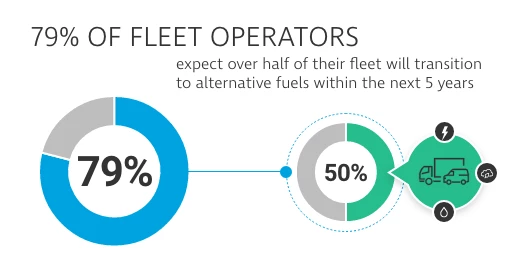Key Takeaways
Across industries, fleets continue to evolve, and this evolution is heavily focused on a transition to cleaner energy, which is crucial for sustainable fleet management. Advanced technologies can help support this transition, enabling fleet operators to effectively manage the complexity of diverse energy resources. This guide outlines the technology that supports these changes and what this transition means for the future of fleet management.
Table of Contents
Understanding Mixed Energy Fleets
The shift toward mixed-energy fleets is driven by the need to diversify energy sources and reduce environmental impact. Fleet operators are increasingly adopting alternative energy options to move away from reliance on fossil fuels.
What is a Mixed Energy Fleet?
A mixed-energy fleet is composed of vehicles that utilize various energy sources beyond traditional gasoline or diesel. These sources can include Compressed Natural Gas (CNG), Renewable Natural Gas (RNG), electric vehicles (EVs), and hydrogen. This diversification reduces dependence on fossil fuels and supports environmental sustainability.
Current Landscape
According to our TS24 Telematics Survey, 79% of fleet operators anticipate that over half of their fleet will transition to alternative fuels within the next five years. CNG and RNG are well-established, especially in the transit, delivery, and waste management sectors. Meanwhile, electric and hydrogen-powered vehicles are emerging as potential mid- to long-term solutions, with large companies like Amazon leading the way in experimentation and early adoption.

Challenges in Managing Mixed Energy Fleets
Adopting mixed-energy fleets introduces a range of new challenges for fleet managers. From operational logistics to technical hurdles and regulatory compliance, each aspect requires careful consideration and planning. Understanding these challenges is essential for successfully developing effective strategies for managing mixed-energy fleets.
Operational Challenges
Transitioning to a mixed energy fleet presents several operational challenges. Fleet managers must clearly define their objectives, from meeting emissions regulations to integrating cost efficiencies into operations. Infrastructure development is another significant challenge, requiring collaboration with local authorities and utility providers to ensure appropriate infrastructure and right-sizing. Additionally, managers must address the learning curve associated with new technologies, which often involve extensive training for team members.
Technical Challenges
The integration of multiple energy sources complicates fleet operations. Fleet managers must ensure consistent performance across different energy types and manage their accessibility. This includes the logistical complexities of maintaining various fueling or charging stations within a single operational framework. The variability in energy source performance due to weather and terrain can also add complexity.
Regulatory and Compliance Challenges
Navigating the regulatory landscape for different energy sources requires flexibility and foresight. Fleet operators must stay informed about local, national, and international regulations, which vary significantly by region and energy type. This often involves planning fleets accordingly to comply with regulations and securing funding through grants and incentives.
Telematics plays a crucial role in managing mixed-energy fleets. Technology like our TN360 platform provides essential data on fuel usage, vehicle health, and routing optimization based on available fueling options. IoT devices help monitor vehicle performance and infrastructure status in real-time, while AI enhances decision-making and predictive analytics. These technologies automate routine tasks, reduce human error, and increase efficiency.
Technological Solutions for Mixed Energy Fleets
Advanced technologies play a critical role in addressing the complexities of managing mixed-energy fleets. From telematics to data analytics, these solutions provide the tools necessary for optimizing fleet operations and ensuring efficient energy management.
Key Technologies
Telematics will continue to play a crucial role in managing mixed-energy fleets, with operators wanting to improve driver behavior, monitor vehicle health and enhance routing, whether they’re running internal combustion or alternative fuel vehicles. Alongside telematics new technologies are emerging that are designed to simplify the management of infrastructure and optimize energy use.
Managing a mixed energy infrastructure can quickly become complex and success starts by laying the right foundation. Predictive analytics software is now available that helps operators understand transition feasibility, energy requirements and the infrastructure to support it. These tools help businesses develop effective transition plans that remove many of the financial and operational risks that can hamper carbon reduction programs.
Energy Management Software is also now available to help operators manage and optimize energy use. The tools provide 24/7 monitoring of the energy ecosystem, offer remote diagnostics repair, automatically optimize when and where energy is acquired and provide the visibility to ensure that fleets are reducing total cost of ownership.
Our TS24 Survey highlighted that the constantly emerging new technology was the biggest barrier to decarbonization plans, and by taking a data driven approach operators can cut through the noise and start to accelerate energy transition in the parts of their business where the technology is available. 98% of fleet operators are currently using a telematics solution on all or part of their fleet with 47% currently using AI solutions in their fleets, as well.
Role of Data and Analytics
Data analytics is central to effective fleet management. Key metrics such as vehicle health, energy usage, and infrastructure availability guide strategic decisions. Our Electrical Vehicle Evaluator is an example of a platform that utilizes telematics data to understand vehicle usage and simulate if vehicles can transition to electric variants and the charging infrastructure that would be required.

The Future of Fleet Management Technology
As fleet management continues to evolve, emerging technologies will transform the landscape further. Innovations in battery technology, fuel cells, and other areas will drive efficiency and sustainability, making mixed-energy fleets more viable and attractive.
Emerging Technologies
Emerging technologies like solid-state batteries will lower costs and improve the performance of electric fleets, making investments in new energy types more feasible. Innovations in fuel cell technology could further enhance the viability of hydrogen as a mainstream energy source for fleets. These technologies will drive down costs and improve performance as they evolve, making alternative energy solutions more attractive.
Sustainability and Efficiency
Each alternative energy type contributes differently to sustainability goals. Electric vehicles offer zero tailpipe emissions and are increasingly viable with a more sustainable electricity grid. Hydrogen fuel cells present a promising solution for heavy-duty transport despite the need for infrastructure development. While not zero-emission, biodiesel and renewable diesel blends still significantly reduce carbon output. Understanding these variations helps fleet managers align their strategies with specific sustainability objectives.
Advice for Fleet Operators
Transitioning to mixed-energy fleets is not a one-time change, but a continuous process of improvement and adaptation. Fleet managers should start with small, manageable changes and scale up as they become more familiar with new technologies. Partnering with experienced companies can provide invaluable support during this period. This commitment to continuous improvement is underscored by our TS24 Survey, with 40% of respondents looking for expert consultants or dedicated training courses for alternative fuel transition guidance.
Learn More About Managing Mixed Fleets
Mixed energy solutions allow fleet operators to meet regulatory demands while driving greater operational efficiency and sustainability. Through continuous innovation and strategic planning, technology simplifies the complex task of managing mixed energy fleets, enabling operators to future-proof their operations and thrive in a rapidly evolving industry landscape.
To learn more about managing mixed fleets, explore our resources covering fleet management solutions and mixed-energy fleet solutions. You can also contact our team for more information about how Teletrac Navman's TN360 platform can help you manage your mixed fleet efficiently.

